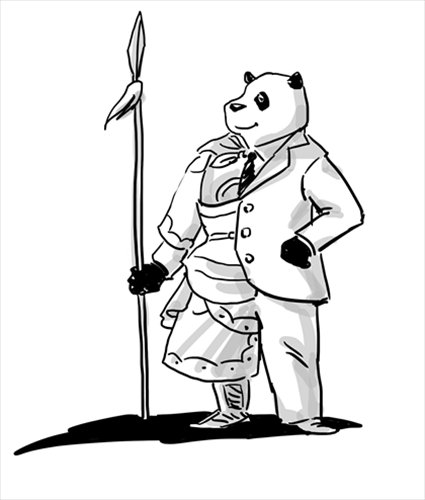HOME >> OP-ED
Institution-building key to regional diplomacy
By Ding Gang Source:Global Times Published: 2014-4-16 22:43:01

Illustration: Liu Rui/GT
Two security patterns could emerge in Asia in the future. One is a balance maintained through multilateral mechanisms where major forces like China, the US and Japan would jointly participate in rule-making and collaborate within certain mechanisms to solve existing and potential conflicts or frictions.
The other is a balance of power among different forces, in which major players would slide back to the Cold War, an upgrade in force by one party would lead up to a response from the other, and ultimately a risky balance would be achieved.
The biggest diplomatic challenge that Beijing is facing is moving away from the second mode and realizing a balance through mechanisms. This is also key to long-lasting prosperity and stability in Asia.
This depends on not only how much sincerity the US and Japan demonstrate facing a rising China, but also how a rising China itself, through strategic implementation, guides the setup of mechanisms to ensure Asian stability.
Currently China's major political task at home is to improve the establishment of institutions. In fact, it also has the same task of institution-building in the international arena, especially in Asia.
So far, despite differences in institutions and ideologies, China's rise hasn't triggered the sharp confrontation that existed between the Soviet Union and the West.
Some Chinese scholars believe that Beijing is able to effectively dissolve frequent punches from the West, because it adopts a "sponge policy," where all the punches fall on a sponge, which doesn't hurt China, but are both energy-consuming and useless for the West.
China focuses on economic growth and avoids debates and confrontation. As a result, Pacific nations including the US and Japan have shared the dividends from China's economic growth.
But now, it is inadequate to purely rely on such a "sponge policy." China must have a strategy to shape Asia's future. This is not a punch back, but means guidance.
It is one thing to safeguard peaceful development with one's own strength, but another to dissolve confrontations and establish mechanisms with the same strength. The latter is most important, and it is the strategy that China needs most at the moment.
Strategy calls for long-term insights. It does not mean losing direction due to small disputes in the short run, not to mention being busy dealing with troubles and following the pace of others.
Currently while handling neighborhood affairs, especially over territorial disputes, China still focuses on "strong responses." When the other party takes action, China takes a tough stance to show its own strength and determination.
On issues relating to China's core interests, it is indeed important to make the nation's stance crystal-clear, but it is also necessary to demonstrate that this stance is backed by powerful military forces. Nonetheless, this is just one side of a strategy.
China has to have a strategic design for Asia's security pattern, and based on this design, to guide the whole region to move toward the new order, rather than simply watch other parties' actions all day long.
Only when diplomatic input matches military input can a comprehensive strategy be formed.
China should especially shelve some problems that cannot be solved in the short term, and prevent some small frictions and conflicts from disturbing strategic implementation. Otherwise, it may become a potential coordinator working for other parties' strategies.
In order to grasp the initiatives, China cannot rely on passive responses, but instead on promoting strategic projects such as China-ASEAN negotiations on the Code of Conduct in the South China Sea, China-Japan-South Korea talks on a trilateral free trade agreement, and the Bangladesh-China-India-Myanmar Economic Corridor.
It is unlikely that China will become the only leading power in Asia or govern the entire region only with hard power.
This year marks the 100th anniversary of the breakout of WWI. The world has achieved great progress in establishing institutions for maintaining peace over the past century, though they're still imperfect. This provides an opportunity for China to win regional and global recognition of its rise. China can effectively dissolve the US-Japan alliance through integrating it with a multilateral mechanism of regional governance. By doing so, China will make a historical change to the way great powers rise.
The author is a senior editor with People's Daily. He is now stationed in Brazil. dinggang@globaltimes.com.cn. Follow him on Twitter at @dinggangchina
Posted in: Columnists, Viewpoint